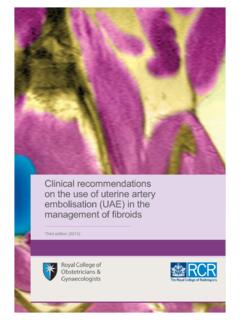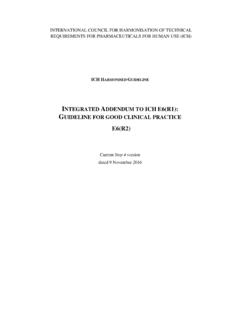Transcription of OVERVIEW OF RANDOMIZED CONTROLLED TRIALS
1 Review Article OVERVIEW OF RANDOMIZED CONTROLLED TRIALS DR. RATHAI RAJAGOPALAN1, DR. PRIYADARSHINI , DR. SRIKANTH*2 1 Department of Pharmacology, medical college, MSR Nagar, MSRIT post, Bangalore, 560054, India, 2 Department of Pharmacology, Khaja Banda Nawaz institute of medical sciences, Gulbarga, 585104, : Received:19 May 2013 , Revised and Accepted:16 June 2013 ABSTRACT RANDOMIZED CONTROLLED TRIALS are considered to be the gold standard in clinical studies to establish level of evidence in medical research. But, they are not easy to conduct and various other aspects have to be looked into.
2 Randomization offers each enrolled subject equal chance of being allocated to the intervention and the control groups. RANDOMIZED control trial (RCT) is most powerful tool in clinical research. In this, subjects are assigned to different groups of interventions by chance for comparison. RCT is only study design which can help us evaluate a new treatment. By assigning participants to different intervention groups by chance, comparison between the interventions groups is made. Purpose of randomization is to make the treatment groups comparable, eliminates the source of and it ensures that the difference in groups is only due to trial treatments.
3 In this article, we review RANDOMIZED control trial with special emphasis on various types of RANDOMIZED CONTROLLED TRIALS , their characteristics, the process of randomization, and advantages and drawbacks of RANDOMIZED CONTROLLED TRIALS . Keywords: Randmized CONTROLLED TRIALS , study design, randomization, clinical researchINTRODUCTION RANDOMIZED CONTROLLED trial is defined as An epidemiological experiment in which subjects in a population are randomly allocated into groups, usually called study and control groups, to receive or not receive an experimental preventive or therapeutic procedure, maneuver, or intervention.
4 The results are assessed by rigorous comparison of rates of disease, death, recovery, or other appropriate outcome in the study and control groups [1]. The terms " RANDOMIZED Control Trial" and RANDOMIZED trial are often used synonymously, but some authors distinguish between " RANDOMIZED Control Trial" which compare treatment groups with control groups not receiving treatment (as in a placebo- CONTROLLED study), and " RANDOMIZED TRIALS " which can compare multiple treatment groups with each other [2].
5 First published RCT in medicine is credited to Sir A. Bradford Hill [3], an epidemiologist for England s Medical Research Council. Randomization as a basic principle of experimental design in the 1920s was developed by RA Fisher who presented randomization as an essential ingredient of his approach to the design and analysis of experiments, validating significance tests predominantly in agricultural research [4]. RCTs are now recognized as optimal method for rational therapeutics in medicine [5].
6 To improve the reporting of RCTs in the medical journals, Consolidated Standards of Reporting TRIALS (CONSORT) Statements were published regularly, the last being published in 2010 by an international group of scientists and editors which have become widely accepted to improve the reporting of RCTs [6]. Intervention TRIALS ( CONTROLLED TRIALS ) The term intervention refers to treatment and in its much wider sense includes prevention strategies, screening programs, diagnostic tests, interventional procedures, educational models and the setting in which health care is provided.
7 In a intervention trial primary exposure under study is applied by the investigator. These are the only experimental form of epidemiologic studies, though they are also observational in that subjects remain in their ordinary habitats. In an intervention trial, the investigator decides which subjects are to be exposed and which are not. STUDY POUPULATIONI ntervention groupControl groupOutcomeNo outcomeOutcomeNo outcomeDirection of enquiry Fig. 3: Outline of an intervention trial [7] Nonrandomized CONTROLLED A study where participants have been assigned to the treatment, procedure, or intervention alternatives by a method that is not random.
8 The investigator defines and manages the alternatives. This is an experimental study in which people are allocated to different interventions using methods that are not random. In these studies, allocation to different groups is done arbitrarily. This kind of study design may sometimes overestimate the advantages of one treatment over other [8]. Non- RANDOMIZED TRIALS are a type of quasi-experimental design. Non- RANDOMIZED clinical TRIALS are sometimes referred to as quasi-experimental clinical TRIALS or non-equivalent control group designs because the characteristics of subjects in non- RANDOMIZED groups will tend to be non-equivalent.
9 The estimation of intervention effects in non- RANDOMIZED clinical TRIALS may be biased if group differences in subject characteristics are not CONTROLLED for in the data analysis When is it appropriate to use a non- RANDOMIZED trial design? When the act of random allocation may reduce the effectiveness of the intervention (Occurs when the effectiveness of the intervention depends on the participant s active participation which is influenced by their beliefs and preferences)
10 When it would be unethical to do random allocation Vol 6, Issue 3, 2013 ISSN - 0974-2441 Dr. Srikanth et al. Asian J Pharm Clin Res, Vol 6, Issue 3, 2013, 32-38 33 When it is impractical to do random allocation ( cost or convenience factors) When there are legal or political obstacles to random allocation RANDOMIZED CONTROLLED trial RANDOMIZED CONTROLLED TRIALS (RCTs) are considered the gold standard in medical research since they offer the best answers about the effectiveness of different therapies or interventions.





